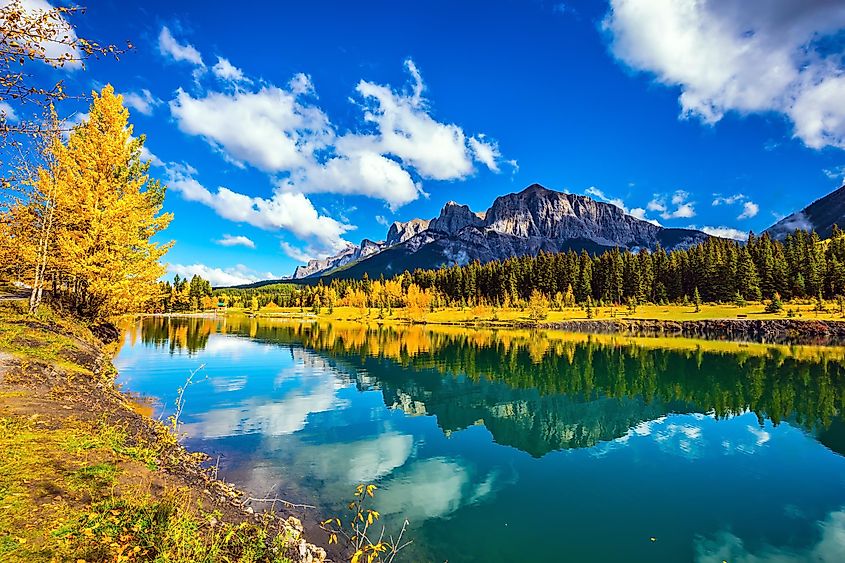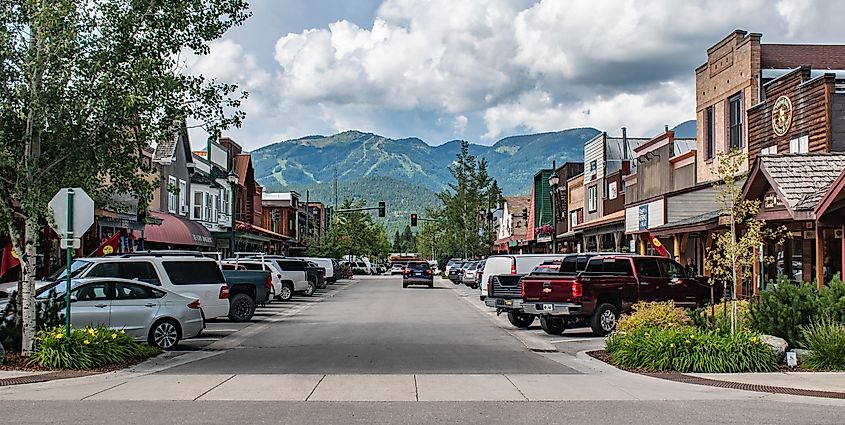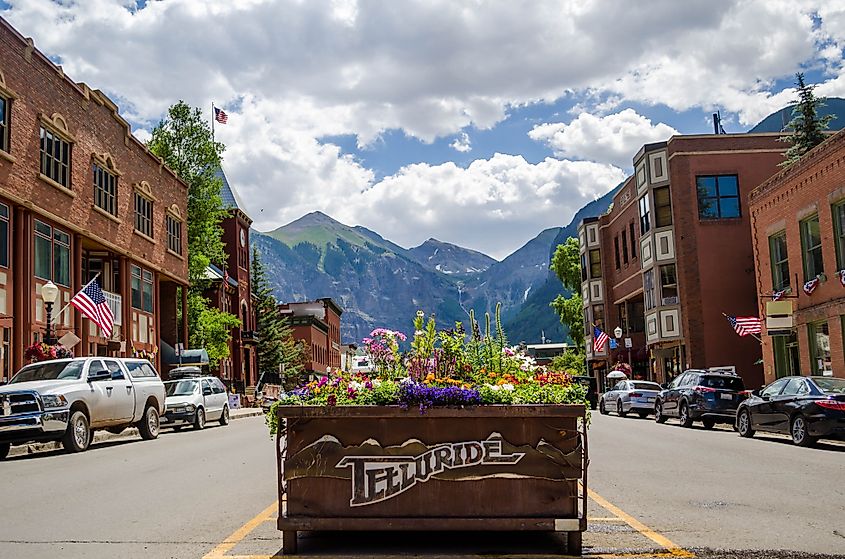
6 Most Scenic Small Towns in the Rockies
The Rocky Mountains, colloquially known as The Rockies, is the primary mountain range of North America. Stretching more than 3,000 miles from north to south, it is the continent's largest system of mountains, covered by two Canadian provinces and six American states. Generations of visitors have been drawn to the spectacular landscapes offered all across the mountain range, with national parks providing direct access to the heart of the wilderness. Amid the grand scheme of nature, there are also small towns in the setting. Many of them boast incredible scenery of the mountains that turn them into destinations themselves. Few places in the world can deliver a colliding experience of being in the outdoors and immersing in the local culture like The Rockies, and these towns are more than qualified to do the trick.
Canmore, Alberta

The Canadian Rockies have many beautiful small towns, but few can match the surrounding scenery of Canmore. About 16,900 people are lucky to call this place home for its picturesque location in the Bow Valley and towered by jagged peaks with names like the Three Sisters. Canmore calls itself the "Gateway of the Rockies" as it is the first town of its size that greets visitors coming in from Calgary, which is only an hour away on the Trans-Canada Highway. The so-called Main Street gives a perfect view of the trio summits, a backdrop that its residents and visitors have taken for granted while shopping in its boutiques and enjoying a meal in the many patio restaurants. Stop by the Canmore Museum to learn about local history through photographs and artifacts donated by the community. Before you know it, the wilderness is calling, from the sounds of the flowing stream to the winds of a snowcapped mountain. Gather your rafts and boots; adventure is waiting at every turn.
Nelson, British Columbia

A place to stay active, rejuvenate, and get away from it all! Nelson is located in the Selkirk Mountains of the Canadian Rockies in southeastern British Columbia. Small but growing, its 10,000 residents have always enjoyed the scenic nature around, where hiking up to Pulpit Rock and cycling down Morning Mountain are favorite pastimes for many. Facing the West Arm of Kootenay Lake, the town center of Nelson is a vibrant mix of coffee shops and boutiques and is reputed to have more restaurants per capita than Manhattan. Beer connoisseurs will love Nelson for its three award-winning breweries, while many pubs, such as Broken Hill, also offer a few of their best products on tap. Summer is a lot of fun here, from its farmers market to the colorful International Mural Festival, and not forgetting all the outdoor activities you can do on land, water, and even air. But coming in winter is also an exciting decision, for its location on the "Powder Highway" and with more cat and heli-ski operators than anywhere in the province; Nelson isn't called the best ski town in North America for nothing.
Whitefish, Montana

In the northwest of Montana, where the Rocky Mountains begin their journey into the continental U.S.A., there is Whitefish. It is the gateway to one of the most spectacular corners of the mountain range - Glacier National Park, with a train depot serviced by Amtrak's Empire Builder two times a day and an airport located about 15 minutes away, bringing visitors to this seemingly remote part of the state. Home to around 8,500 people, Whitefish is developed with recreation in mind, where visitors can easily engage in leisure and outdoor activities without straying far from town. From golfing in the area's only 36-hole facility at Whitefish Lake to rock climbing in nearby Kila, there is plenty to keep anyone occupied for the day. Stick to the pocket-sized town center where Central Avenue lays out its best collection of art galleries, cafes, and restaurants, and don't miss a show of live music and performance at the Whitefish Theater Company. Head 7 miles north of town, and you are in another world at the Whitefish Mountain Resort. Sun or snow, the chairlifts operate up and down the hill for hikers and skiers. The 3000-acre terrain has more space for every kind of outdoor fun than you could ask for.
Jackson, Wyoming

One of the most famous towns in the Rockies, where the yesteryear of the Wild West echoes the loudest, Jackson is a legendary addition to the dramatic mountain landscape of western Wyoming. Tracing its roots to the early 19th century, the town first started as a fur trading post before slowly building up to become the mountain resort it is today. Visitors often find the community of 10,700 atmospheric for its amount of frontier-style buildings, largely centered around the historic Town Square, where the four large arches made of elk antler sheds continue to stand on each corner. There is a lot of history to take in here, and a good place for it is the Jackson Hole Historical Society & Museum, which has exhibits ranging from Native Americans to ranchers and conservationists of the past. While the town has its attractions to keep anyone lingering, the real treasure of Jackson is undoubtedly the natural landscape, which has never failed to captivate visitors for generations. No visit here is complete without exploring the heights and depths of Grand Teton National Park, where bison roam in the fields and forests under the shadows of 12,000-foot-high snowy peaks, and further afield is none other than Yellowstone National Park, one of the continent's greatest geological marvels. Outdoor pursuits can find the best of nature in both parks, but there are also three incredible mountain resorts within the vicinity of town for all sorts of activities in summer and winter.
Estes Park, Colorado

Long been a place of retreat and adventure, Estes Park welcomes visitors with open arms to the rugged heart of northern Colorado and serves as the entry to the state's most breathtaking nature reserve - Rocky Mountains National Park. Even in town, the surrounding landscape is a sight to behold, where it meets the giant cliffs and boulders of Lumpy Ridge on one side and the shores of Lake Estes on another. The small population of 5,900 has taken great advantage of their backyard with outdoor activities such as hiking, mountain biking, and boating, and in winter, there is snowshoeing and backcountry skiing to be done. Estes Park has something for culture vultures, too, from the haunting tales of the iconic Stanley Hotel to the historic grounds of MacGregor Ranch, and there is more to discover in the antique shops and boutiques all along Elkhorn Avenue. Throughout the year, events like the Rooftop Rodeo and Elk Fest keep the small town alive, as if the live music and shows of its pubs and bars haven't done enough.
Telluride, Colorado

Another of Colorado's entries is Telluride. Set in a box canyon in the southwest of the state, the town of 2,600 people has a stunning backdrop of the Rocky Mountains, which has always signaled visitors to come closer. See the view from Colorado Avenue before checking out the cafes, restaurants, and boutiques with their false-front facades that neatly line the street, some of which still survive from the heyday of its mining past. Telluride's lofty elevation of 8,750 feet is naturally designed for the outdoors, drawing visitors every season to its alpine terrain to not only admire the scenery but also hit the trails and slopes with their mountain bikes, snowboards, or simply a pair of laced boots. A gondola ride up to Telluride Ski Resort is a quick passage to access those activities, which, despite its name, has transformed to accommodate more than just winter sports. The waterfalls of Bridal Veil and Beaver Creek are two other spectacles no visitors should miss. No matter the time of year and the purpose, it is affirmative that this is one incredible town to visit in the Rockies.
From quaint and easygoing Canmore to the classic charm of Estes Park, from north to south, the Rocky Mountains host one amazing town to another with scenery that everyone can appreciate without drifting too far into the wild. The mountains bring a sense of adventure to visitors, and these small towns serve not only as a gateway but also as destinations themselves. The small towns of the Rockies are one-of-a-kind when it comes to delivering both nature and the comforts of travel, all framed by scenic vistas in every direction.











